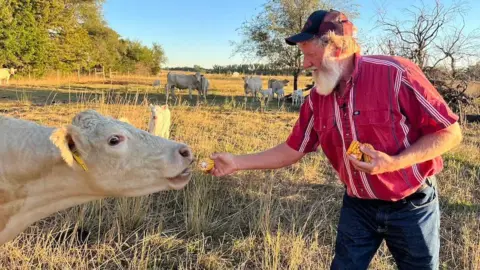Trump’s Stronghold in Rural America: Can Folksy Walz Boost Harris?Cau
In the upcoming U.S. election, vice-presidential candidates JD Vance and Tim Walz are being positioned to attract Midwestern and rural voters who might be wavering between Donald Trump and Kamala Harris. Nebraska, with its unique electoral system, could be crucial for these voters.
Wade Bennett, a dedicated Republican and cattle breeder in Nebraska, expresses uncertainty about Trump’s character, admitting that if other conservative options existed, he might reconsider his support. Despite his reservations, he prioritizes Trump’s policies on issues like immigration and the economy, even as he acknowledges the moral dilemmas posed by Trump’s personal conduct.
Rural America has shifted dramatically toward the Republican Party over the past two decades. In 2000, Republicans held a modest six-point lead among rural voters, but by 2024, that lead has ballooned to 25 points. This shift was significant in Trump’s 2016 victory, but Democrats are still vying for rural support, especially in tight races.
Both Harris and Trump have running mates who leverage their rural backgrounds to appeal to these voters. Walz, Minnesota’s governor, emphasizes his small-town roots and experience in education, hoping to connect with struggling families. Vance, however, frames his narrative around the hardships faced by working-class communities, advocating for individual responsibility without cutting vital social programs
.
The cost of living remains a pressing issue for voters like Shana Callahan, who laments rising prices under the current administration. Although economic realities are complex, her sentiments illustrate the emotional weight of these issues in elections.
Nebraska’s electoral quirks add to the stakes; its votes are allocated through a unique district system, meaning that a single district could hold the key to the presidency. The second district, which swung between Trump and Biden in previous elections, could be pivotal again.
As both parties intensify their efforts, the Harris-Walz campaign is heavily investing in advertising to maintain a Democratic foothold in the district. Local voters express trust in Walz, appreciating his relatability and stance against divisiveness.
Despite a prevailing Republican sentiment, Nebraska’s nonpartisan state legislature encourages a different political dynamic, fostering local discussions rather than national partisanship. Some local Democrats, like Michelle Smith, aim to bridge divides by focusing on community issues rather than national politics.
While the Republican Party has sought to consolidate power through a winner-takes-all approach, resistance from local senators indicates a desire to preserve Nebraska’s unique political leverage. Regardless of how the election unfolds, Nebraska’s landscape reflects broader national tensions and aspirations.